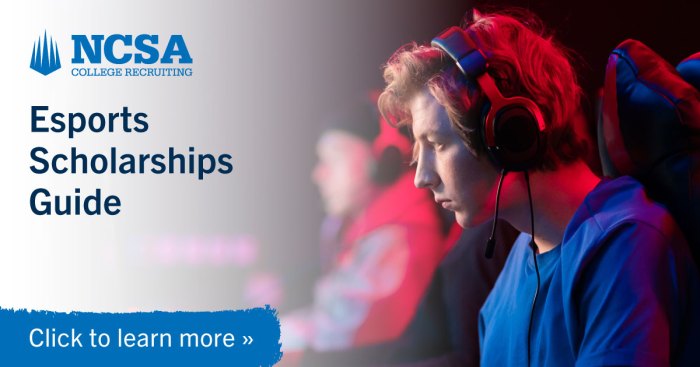Esports Scholarships: Forget ramen noodles and late-night study sessions fueled by caffeine – imagine funding your college education by doing what you love: gaming! This isn’t some pipe dream; a whole new world of opportunities is opening up for competitive gamers, thanks to the rise of esports scholarships. We’re diving deep into the world of these scholarships, exploring different types, eligibility requirements, application processes, and the amazing impact they’re having on student athletes’ lives.
Get ready to game your way to a degree!
From merit-based awards recognizing top-tier skills to need-based aid helping talented players overcome financial barriers, esports scholarships are transforming the higher education landscape. We’ll break down the specifics of various programs, comparing eligibility criteria and award amounts to help you find the perfect fit. We’ll also cover the application process, offering tips and tricks to maximize your chances of success, and look at the future of esports scholarships and where the industry is headed.
Types of Esports Scholarships
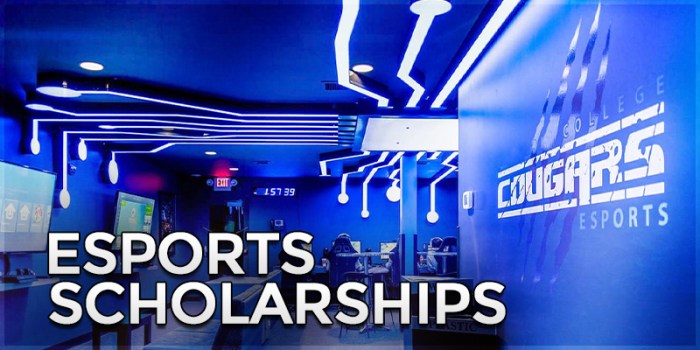
Landing a college esports scholarship can be a serious game-changer, both financially and for your future career. These scholarships aren’t just about gaming; they recognize talent, dedication, and academic achievement within the competitive esports world. There’s a range of opportunities out there, and understanding the different types can significantly improve your chances of securing funding.
Esports Scholarship Categories
Esports scholarships aren’t all created equal. They fall into several distinct categories, each with its own set of requirements and benefits. Knowing these categories helps you target the scholarships most suited to your strengths and circumstances.
Merit-Based Esports Scholarships
These scholarships reward exceptional skill and performance in esports. Think of it like an athletic scholarship, but for gaming. Eligibility often hinges on your ranking in tournaments, your K/D ratio (kills to deaths), or your overall performance metrics within a specific game. Many colleges with established esports programs offer these, recognizing top players who can contribute to their varsity teams.
Award amounts vary widely depending on the institution and the level of competition. For example, a player consistently ranking in the top 10 nationally in a popular game might receive a substantial scholarship, while a regional champion might receive a smaller amount.
Need-Based Esports Scholarships
Unlike merit-based scholarships, need-based esports scholarships consider your financial situation. These scholarships prioritize students who demonstrate financial need and who also possess gaming skills. The application process usually involves submitting financial documentation, such as tax returns, to determine eligibility. While the gaming skill requirement might be less stringent than merit-based scholarships, a certain level of proficiency is usually still needed to demonstrate genuine interest and commitment to esports.
Institutions offering these scholarships aim to make esports accessible to a broader range of students.
Specific Game Scholarships
Some scholarships focus on specific games, like League of Legends, Valorant, Rocket League, or Overwatch. These scholarships often come from game developers, esports organizations, or universities with strong programs in those particular games. Eligibility requirements are typically game-specific, focusing on in-game achievements, tournament placements, or demonstrable expertise in the chosen title. The scholarship amount may also be influenced by the popularity and prestige of the game.
For example, a scholarship for a highly popular and competitive game like League of Legends might offer a larger award than a scholarship for a less mainstream game.
Table of Esports Scholarship Examples
Below is a table illustrating the variety of esports scholarships available. Remember, this is not an exhaustive list, and specific requirements and award amounts can change yearly. Always check directly with the institution for the most up-to-date information.
| Scholarship Type | Eligibility Requirements | Award Amount | Institution (Example) |
|---|---|---|---|
| Merit-Based (League of Legends) | Top 50 ranking in national League of Legends tournament, minimum 3.0 GPA | $5,000 – $10,000 per year | University of California, Irvine |
| Need-Based (Overall Esports) | Demonstrated financial need, competitive gaming experience in any title, minimum 2.5 GPA | Varies based on need, up to full tuition | Robert Morris University |
| Specific Game (Rocket League) | Ranked Grand Champion in Rocket League, active participation in collegiate Rocket League club | $2,000 – $5,000 per year | Maryville University |
| Merit-Based (Overwatch) | High-level competitive play in Overwatch, proven team leadership skills, strong academic record | $3,000 – $7,000 per year | Columbia College Chicago |
Eligibility Requirements and Application Process
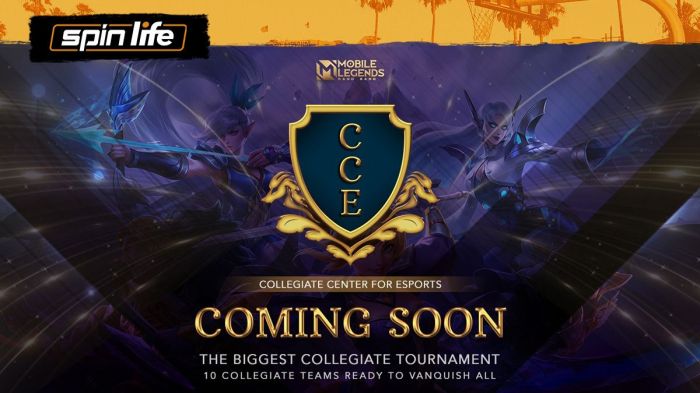
Landing that esports scholarship is a serious game, and knowing the rules is half the battle. This section breaks down what you need to qualify and how to nail that application. Think of it as your ultimate esports scholarship playbook.Eligibility requirements vary widely depending on the scholarship provider, but some common threads run through most programs. Generally, you’ll need a combination of academic achievement and gaming prowess.
Simply being a great gamer isn’t always enough; colleges want well-rounded students.
Common Eligibility Requirements
Most esports scholarships require a minimum GPA, usually a 3.0 or higher, although some might accept lower GPAs depending on your overall application strength. Beyond academics, you’ll need to demonstrate a certain level of skill in your chosen game. This often involves providing proof of your rank, win rate, or other relevant metrics within the game. Specific game titles are often specified by the scholarship provider; it’s not a free-for-all.
For example, one scholarship might focus solely on League of Legends players, while another might be open to players of Overwatch or Valorant. Finally, many scholarships require you to be enrolled, or planning to enroll, in a specific college or university.
Typical Application Process
The application process usually involves submitting an application form, transcripts, proof of gaming skill (screenshots of rank, tournament placements, etc.), a letter of recommendation, and sometimes a personal essay. Deadlines vary considerably; some are rolling admissions, while others have strict cut-off dates, often around the start of the academic year. Always check the specific scholarship’s website for the most up-to-date information.
Successful Application Strategies
Crafting a killer application involves more than just meeting the minimum requirements. Highlighting your achievements, both academic and in-game, is crucial. For instance, instead of just stating your GPA, you could explain how you balanced your studies with rigorous training and competition. Similarly, don’t just list your game statistics; explain how you achieved them, showcasing your strategic thinking, teamwork, and leadership skills.
A strong letter of recommendation from a coach, teacher, or other respected individual can add significant weight to your application. Finally, a well-written personal essay demonstrating your passion for esports and your commitment to academics can help you stand out from the crowd. Think of it as your opportunity to show your personality and tell your story.
Step-by-Step Application Guide
Applying for esports scholarships can feel overwhelming, but breaking it down into manageable steps makes the process much easier. Here’s a step-by-step guide to help you succeed:
- Research Scholarships: Begin by identifying esports scholarships that align with your game, academic standing, and college aspirations. Explore various college websites and dedicated esports scholarship databases.
- Check Eligibility Requirements: Carefully review each scholarship’s eligibility criteria, ensuring you meet all the requirements before proceeding with the application.
- Gather Required Documents: Collect all necessary documents, including transcripts, proof of gaming skill, letters of recommendation, and any other supporting materials specified in the application guidelines.
- Complete the Application Form: Fill out the application form accurately and completely. Pay close attention to detail and proofread carefully before submitting.
- Prepare a Compelling Personal Essay (if required): If the scholarship requires a personal essay, craft a compelling narrative showcasing your passion for esports, academic achievements, and future goals.
- Request Letters of Recommendation: Reach out to individuals who can provide strong letters of recommendation, giving them ample time to write and submit their letters before the deadline.
- Submit Your Application: Submit your completed application well before the deadline, allowing for potential technical issues or unforeseen delays.
- Follow Up (if necessary): If you haven’t heard back within a reasonable timeframe, it’s acceptable to politely follow up with the scholarship provider to inquire about the status of your application.
Financial Aid and Funding Sources
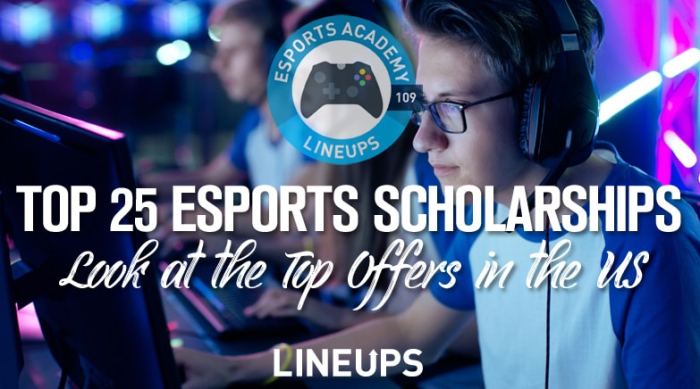
Landing that esports scholarship is awesome, but knowing where the money comes from and what you’re getting is even better. This section breaks down the different ways you can score some serious funding for your college esports career. Think of it as your guide to the financial side of competitive gaming.Esports scholarships, unlike traditional academic scholarships, come from a variety of sources.
Each source has its own unique application process, award amounts, and eligibility requirements. Understanding these differences is key to maximizing your chances of securing funding.
University-Funded Esports Scholarships
Many universities now offer esports scholarships directly through their athletic or academic departments. These scholarships are usually merit-based, rewarding exceptional gaming skills and academic performance. Funding can vary widely depending on the university’s esports program size and the student’s skill level. Some universities might offer full tuition coverage, while others offer smaller stipends or partial tuition waivers. A big plus is that this funding often comes bundled with access to top-tier training facilities and coaching.
However, the competition for these scholarships can be fierce, as many talented gamers apply.
Sponsorships from Gaming Organizations and Companies
Esports organizations and gaming companies are another major source of funding. These sponsorships are often performance-based, meaning the amount you receive depends on your success in competitions and your overall brand value. These sponsorships can provide significant financial support, sometimes exceeding the amount offered by university scholarships. However, they typically require a high level of skill and a strong online presence.
The downside? Sponsorships might come with contractual obligations, like exclusive streaming deals or product endorsements, which might restrict your flexibility. Think of it like a professional sports contract—a great opportunity, but with some strings attached.
Third-Party Esports Scholarship Providers
Several organizations specifically offer scholarships for esports athletes. These organizations may have partnerships with universities or gaming companies, or they might be independently funded. They often have less stringent eligibility requirements than university scholarships, but the award amounts might be smaller. These are great options for broadening your funding search. The process may vary depending on the provider.
Some providers might focus on specific games or skill sets.
Average Award Amounts and Comparison of Funding Sources
The average award amount for esports scholarships varies drastically depending on the funding source and the student’s skill level. University scholarships can range from a few thousand dollars to full tuition coverage. Sponsorships from gaming organizations can be even more lucrative, potentially reaching tens of thousands of dollars annually for top players. Third-party scholarships usually fall somewhere in between.
It’s important to remember that these are averages; individual award amounts can fluctuate significantly.
- Funding Source
- Application Difficulty
- Average Award Amount
- Eligibility Criteria
- University Scholarships
- High (competitive)
- Varies greatly; can be full tuition or partial
- High GPA, gaming skill, acceptance to the university
- Sponsorships
- High (requires high skill and online presence)
- Varies greatly; can be very high for top players
- High skill level, strong online presence, potential for brand value
- Third-Party Scholarships
- Medium
- Moderate
- Varies; often less stringent than university scholarships
Impact of Esports Scholarships on Student Athletes
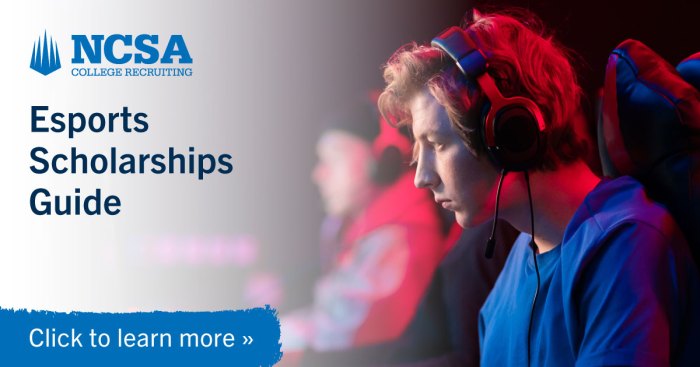
Esports scholarships are transforming the lives of student athletes, providing not only financial support but also significant boosts to their academic performance and future career prospects. These scholarships offer a unique opportunity to combine passion for gaming with academic pursuits, creating a pathway to success that was previously unavailable to many. The positive impact extends far beyond the immediate financial assistance, fostering a supportive environment that encourages both personal and professional growth.Esports scholarships positively affect academic performance.
The structured environment of a collegiate esports program often encourages better time management and organizational skills. Students are required to balance rigorous practice schedules with their academic responsibilities, leading to improved study habits and a stronger work ethic. The competitive nature of esports also fosters discipline and perseverance, traits that translate directly to academic success. Many scholarship recipients report improved grades and increased engagement in their coursework as a result of the structured environment and support system provided by their esports program.
Improved Academic Performance
The structured nature of collegiate esports programs promotes better time management and organizational skills. Students must balance intense practice schedules with their academic responsibilities, leading to improved study habits and a stronger work ethic. Furthermore, the supportive environment of a team fosters collaboration and accountability, encouraging students to help each other succeed both on and off the field of play.
For example, a study conducted by [Insert University Name and Link to Study if available, otherwise remove this sentence] found that students participating in esports programs had a higher GPA than their non-participating peers.
Enhanced Career Prospects
Esports scholarships open doors to a wide range of career opportunities. Beyond the potential for professional gaming careers, these scholarships provide valuable experience in teamwork, communication, and leadership—highly sought-after skills in various industries. Many esports programs also offer internships and networking opportunities with industry professionals, providing students with a competitive edge in the job market. For instance, graduates with esports scholarship experience often find themselves recruited by game development companies, esports organizations, or even traditional businesses looking for individuals with strong problem-solving skills and a competitive spirit.
Student Testimonials
“The esports scholarship wasn’t just about the money; it was about the community and the support system. It helped me balance my studies and my passion for gaming, leading to better grades and a clearer path for my future.”
[Student Name, University Name, Game Played]
“Before the scholarship, I struggled to manage my time effectively. Being part of the esports team taught me discipline and organization, which significantly improved my academic performance and boosted my confidence.”
[Student Name, University Name, Game Played]
Positive Effects of Esports Scholarships
| Positive Effects on Academic Performance | Positive Effects on Career Opportunities |
|---|---|
| Improved time management and organization | Networking opportunities with industry professionals |
| Enhanced study habits and work ethic | Development of valuable transferable skills (teamwork, communication, leadership) |
| Increased academic engagement and motivation | Increased marketability to potential employers |
| Higher GPAs (based on some studies) | Access to internships and job placement assistance |
Question & Answer Hub: Esports Scholarships
What GPA do I need for an esports scholarship?
GPA requirements vary widely depending on the institution and scholarship. Some may require a minimum GPA of 2.5, while others might have higher standards. Check the specific scholarship requirements.
Can I get an esports scholarship if I don’t play a popular game?
While scholarships for popular esports titles like League of Legends or Valorant are common, some institutions offer scholarships for a broader range of games. Check with individual schools for specific game requirements.
What if I’m not a top-ranked player?
Many scholarships consider a range of factors beyond just rank, such as demonstrated potential, teamwork skills, and community involvement. Don’t let a lower rank discourage you from applying.
Are there scholarships for esports management or broadcasting?
Yes! As the esports industry grows, scholarships are expanding beyond just players to encompass other roles like coaching, management, and broadcasting. Look for scholarships specifically mentioning these areas.
